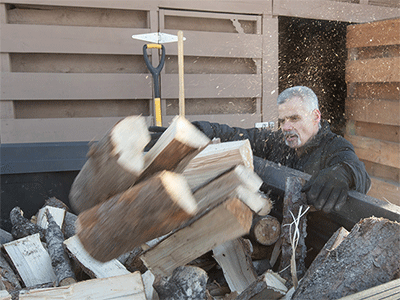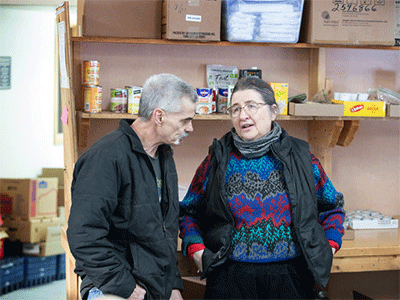Jimmie Hutson said that his wood stove burns the whole winter and must be fed every few hours. Living on a fixed income, he said it’s a blessing to be able to rely on free firewood courtesy of the Willow Community Food Pantry, a ministry of Willow United Methodist Church.
Willow United Methodist Church is a part of the Alaska Annual Conference.
“They take care of me. The truckload I picked up today should get me through the winter,” he said.

Hutson is not just a recipient of the ministry, he also volunteers there, stocking pantry shelves and delivering firewood to others. After recovering from esophageal cancer, he said he spent a few years sitting at home and got bored.
“I came here and asked if they needed help, and I’ve been here four or five years,” he said.
“Because of the food bank, I know everyone in the community. A lot of people around here really depend on the food bank; it’s quite a blessing.”
The food pantry began in 2005 out of a space the church had been using to store donated clothing. Pantry director Ola Williams, then chair of the church outreach team, said they realized there was more need in the area for food than clothes.
Rev. Christina DowlingSoka, co-pastor of Willow United Methodist Church and superintendent of the Alaska Conference said that the ministry serves a community “on the edge.” The nearest United Methodist church to the south is 30 miles away, and 300 miles to the north. Willow has higher unemployment than the national average, the cost of living is 13% above the national average and the cost of food is 31% above the national average.

Fortunately, she said, “everybody knows the UMC is there to help. We have people who have nothing, but they’ll call and tell us they need propane for their heater or whatever.”
The food pantry has a number of partnerships with other community entities that provide necessary resources like food or transportation.
Sunshine Transit is a community organization providing low-cost transportation. As a partner, they provide free rides to the food pantry and also pick up and deliver food for those unable to get to the pantry.
“People often don’t have transportation when they’re off [the] grid, so they come to us and we can take them to get water or showers or other needs,” said Ron Brooks, a driver with Sunshine Transit.
DowlingSoka said the ministry is called the Willow Community Food Pantry rather than Willow United Methodist Food Pantry because it’s a true community endeavor. Volunteers from other churches and those who aren’t churchgoers work side by side with Willow members. People who receive services from the pantry volunteer there as well.
“There’s this sense of mutuality that we’re working side by side. It’s one of those places you really see shalom in the community being lived out,” she said.
Though the church only has about 54 members, the growth of the pantry program led them to construct an addition to the building. That addition was vital when COVID-19 began to spread.
Director Ola Williams said that in the course of a week, they had to completely reimagine the distribution process, from letting people come in to select their own groceries to pre-packing individual bags and distributing them in the parking lot — even in temperatures as low as 20-below-zero. They didn’t return to indoor distribution until last November.
DowlingSoka, who came to Alaska from serving in Tennessee, described her new home as an “area of extremes,” be it extreme need or extreme cold. This reality requires that an otherwise routine ministry like the food pantry be approached in a different way.
excerpt from a story by Joey Butler, multimedia producer/editor. UMNS
This story represents how United Methodist local churches through their Annual Conferences are living as Vital Congregations. A vital congregation is the body of Christ making and engaging disciples for the transformation of the world. Vital congregations are shaped by and witnessed through four focus areas: calling and shaping principled Christian leaders; creating and sustaining new places for new people; ministries with poor people and communities; and abundant health for all.





